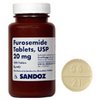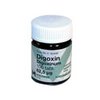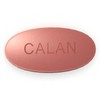INDICATIONS
Furosemide is used for treating fluid build-up and swelling caused by congestive heart failure, liver cirrhosis, or kidney disease. It is also used in combination with other medicines to treat fluid build-up in the lungs. Furosemide is a loop diuretic. Loop diuretics make the kidneys eliminate larger amounts of electrolytes (especially sodium and potassium salts) and water than normal (diuretic effect). Loop diuretics are useful for treating many conditions in which salt and water retention (eg, edema, swelling) is a problem.
INSTRUCTIONS
Use Furosemide as directed by your doctor.
- Do not take the medication in larger amounts, or take it for longer than recommended by your doctor. Follow the directions on your prescription label.
- Your doctor may occasionally change your dose to make sure you get the best results from this medication.
- Take Furosemide by mouth with or without food.
- To be sure Furosemide is not causing harmful effects, your blood will need to be tested on a regular basis. Your kidney or liver function may also need to be tested. Do not miss any scheduled appointments.
- If you are being treated for high blood pressure, keep using this medication even if you feel fine. High blood pressure often has no symptoms.
- Furosemide may increase the amount of urine or cause you to urinate more often when you first start taking it. To keep this from disturbing your sleep, try to take your dose before 6 pm.
- If you miss a dose of Furosemide, take it as soon as possible. If it is almost time for your next dose, skip the missed dose and go back to your regular dosing schedule. Do not take 2 doses at once.
Ask your health care provider any questions you may have about how to use Furosemide.
STORAGE
Store Furosemide at room temperature between 68 and 77 degrees F (20 and 25 degrees C) in a tightly closed container. Brief periods at temperatures of 59 to 86 degrees F (15 to 30 degrees C) are permitted. Store away from heat, moisture, and light. Do not store in the bathroom. Keep Furosemide out of the reach of children and away from pets.







